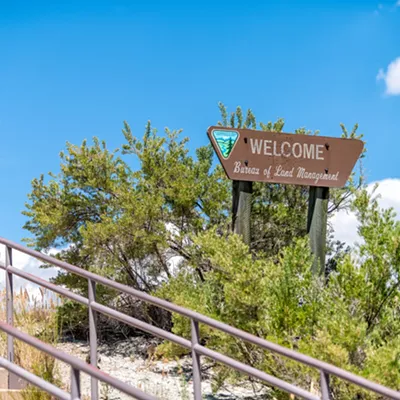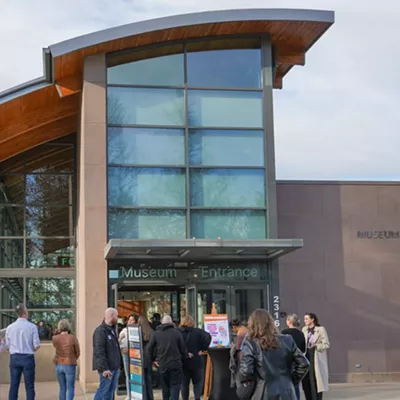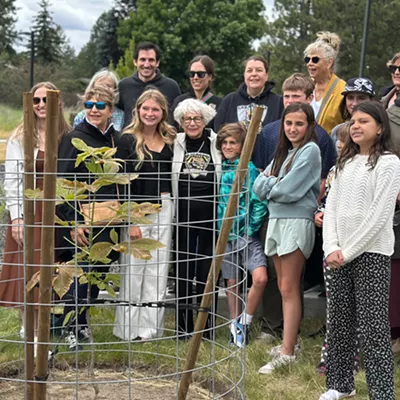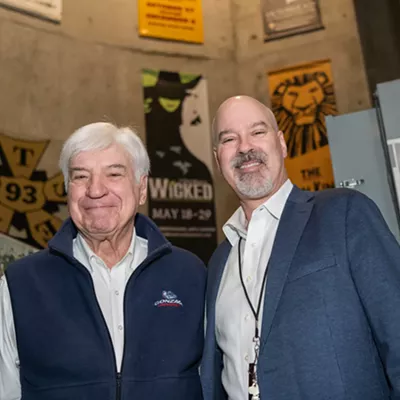Answers can range from the self-evident ("Because I grew up here") to the self-doubting ("Yeah, why does anybody live here?").
You can puzzle over this one all day, but lucky for you, Team Inlander has been kicking around this question and others for a few weeks now, as we've been trying to understand the malaise affecting the Lilac City. Yet another announcement of budget shortfalls in City Hall has made us ask the question all over again. Are some cities just not going to make it in the 21st century, and -- gulp! -- is Spokane one of them? The budget shortfalls are the canary in the coal mine -- shorthand for a range of problems that all point to one thing: The region's leading city is failing to thrive.
On the pages to follow, we test a few theories we have about why Spokane is struggling. Did too many people flee to the suburbs? Did we slash our own funding too drastically? Has running a city just become prohibitively expensive? Along the way, we'll try to offer a few solutions; there are no silver bullets, mind you, but coping strategies are emerging.
So why do people live here? There are two reasons anybody has ever lived in any city: to participate in commerce and to be a part of a community. For millennia, people have gathered to trade with each other, and they have pooled their resources -- and created governments -- to better survive and prosper.
Spokane was no different. Although not located on the coast, it lies at crossroads of vast natural wealth. With crops to the south, mines to the east and timber to the north, Spokane was a massive commercial hub back in its early years. Soon enough, polite society joined in, and it became a community, too.
Which leads me to repeat something I did in the very first Inlander, published 12 years ago today, on Oct. 20, 1993 -- that is, quote from Mark Knopfler's song "Telegraph Road."
A long time ago came a man on a track, & r & walking 30 miles with a pack on his back. & r & And he put down his load where he thought it was the best, & r & made a home in the wilderness. & r & He built a cabin and a winter store, & r & and he plowed up the ground by the cold lake shore. & r & The other travelers came riding down the track, & r & and they never went further, no, they never went back. & r & Then came the churches, then came the schools, & r & then came the lawyers, then came the rules. & r & Then came the trains and the trucks with their loads, & r & and the dirty old track was the telegraph road.
I've always been taken by Knopfler's bucolic version of the way the West was won, but when the road becomes "the dirty old track," storm clouds start rolling in. Is something going wrong on the way to the American Dream? I thought of Knopfler's song again just now, because when you consider the state of Spokane in 2005, it's hard not to conclude that more than a few things are amiss.
& lt;ul & & lt;li & A city fire station opened on 18th Avenue in the late 1980s -- that's 1980s, not 1880s -- may be shuttered due to lack of staffing. & lt;li & A Nobel Prize winner practically pulls his hair out when he hears Spokane libraries are only sporadically open. As a child, he was inspired while exploring Spokane's communal font of knowledge. & lt;li & Spokane Police don't have the staffing necessary to respond to smaller crimes -- a fact duly noted by the city's petty thieves. & lt;li & Global markets have introduced competition, fueled by Third World labor, that has hurt or killed key local industries, including agriculture, mining and smelting. & lt;li & Anti-tax crusaders vilify government in their ongoing war against pooling money for the common good. As a result, higher education has become more expensive; roads have become more crowded and less safe; and social services have been slashed. Most elected leaders toe this line rather than speak up in defense of public progress. & lt;li & City leaders, panicked over the desperate situation and paralyzed by mayoral scandal, turn to the only people they can for help. No, it's not the federal government (they're currently rebuilding Iraq) or the state government (they can't even fix their own roads). It's you (yes, you) -- the city's property owners. & lt;/ul &
To wallow in this mood a bit longer, let's get back to that song.
I used to like to go to work, but they shut it down. & r & I got a right to go to work, but there's no work here to be found. & r & Yes and they say, we're gonna have to pay what's owed. & r & We're gonna have to reap from some seed that's been sowed. & r & But the birds up on the wires and the telegraph poles, & r & they can always fly away from this rain and this cold.
Back in Spokane's heyday, with money flooding the city, it seems like our forefathers managed to keep commerce and community in balance. When Knopfler sings "We're gonna have to reap from some seed that's been sowed," he's underlining the fact that every generation lives on the largesse of the last one. That means every generation had better plant some seeds for the next one; otherwise, they're "gonna have to pay what's owed."
In the 1910s and '20s, seeds that were sowed include a generous parks system, a massive stock of classic architecture and several well-developed industries. In the 1970s, Expo planted a seed that bloomed into Riverfront Park. What seeds have we been sowing these past couple decades? Not enough, we seem to be finding out. Our cupboard is bare.
But unlike those birds up on the wires, we can't just fly away.
This package of stories is about sowing some different seeds -- seeds that may not brighten the city's future (and the region's) overnight, but should in time. To find our way out of this wilderness and reach for a future more like, say, Boise's, let's stick to the fundamentals: a balance of commerce and community.
Buck up, people: Spokane and the Inland Northwest have a big advantage on both fronts. We may not always live up to our potential, but we have tons of it.
& lt;ul & & lt;li & Our natural setting continues to be an asset, with abundant clean water, fertile soil, plentiful power and proximity to the best of the great outdoors, in winter or summer. & lt;li & Our people have the capacity for doing amazing things. The words "Hoopfest," "Bloomsday" and "Expo" are all clich & eacute;s among boosters, but they are also proof of what this town can do when it pulls in the same direction. & lt;li & The fact that there was a hue and cry over the reduced hours at the public libraries suggests that we do value those things we own together. Not everyone has bought into the every-man-for-himself paradigm. & lt;li & With a growing cultural scene, Spokane keeps improving its status as a destination city -- a fun place that can attract and keep dynamic young people. & lt;li & Our location near three of North America's most dynamic cities (Seattle, Portland and Vancouver, B.C.) offers all kinds of potential for greater commerce. & lt;/ul &
People will always wonder why they live in a particular place -- that's just garden-variety existentialism. But here in Spokane, how will we know when we're living in a city -- and region -- that's going to
make it in the 21st century? Probably when those other travelers
who come riding down the track look around and say, "Now why
don't I live here?"
For more about Spokane's Fiduciary problems see our & lt;a href="http://www.inlander.com/localnews/localnews.php" & News Section & lt;/a & .





















